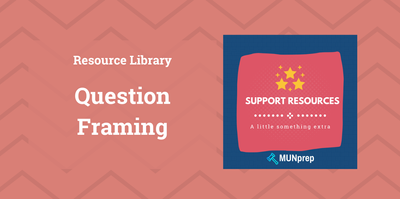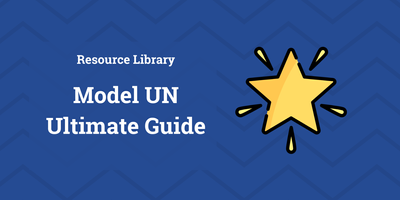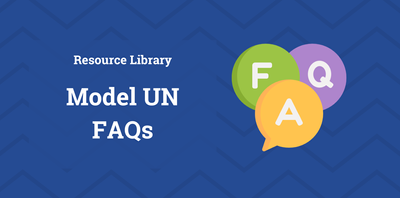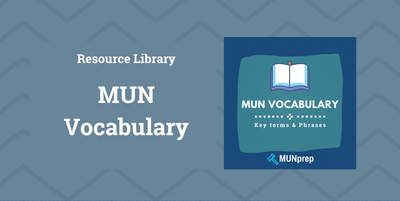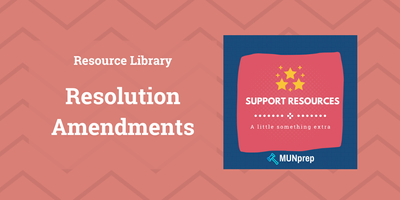MUN Note Passing Guide
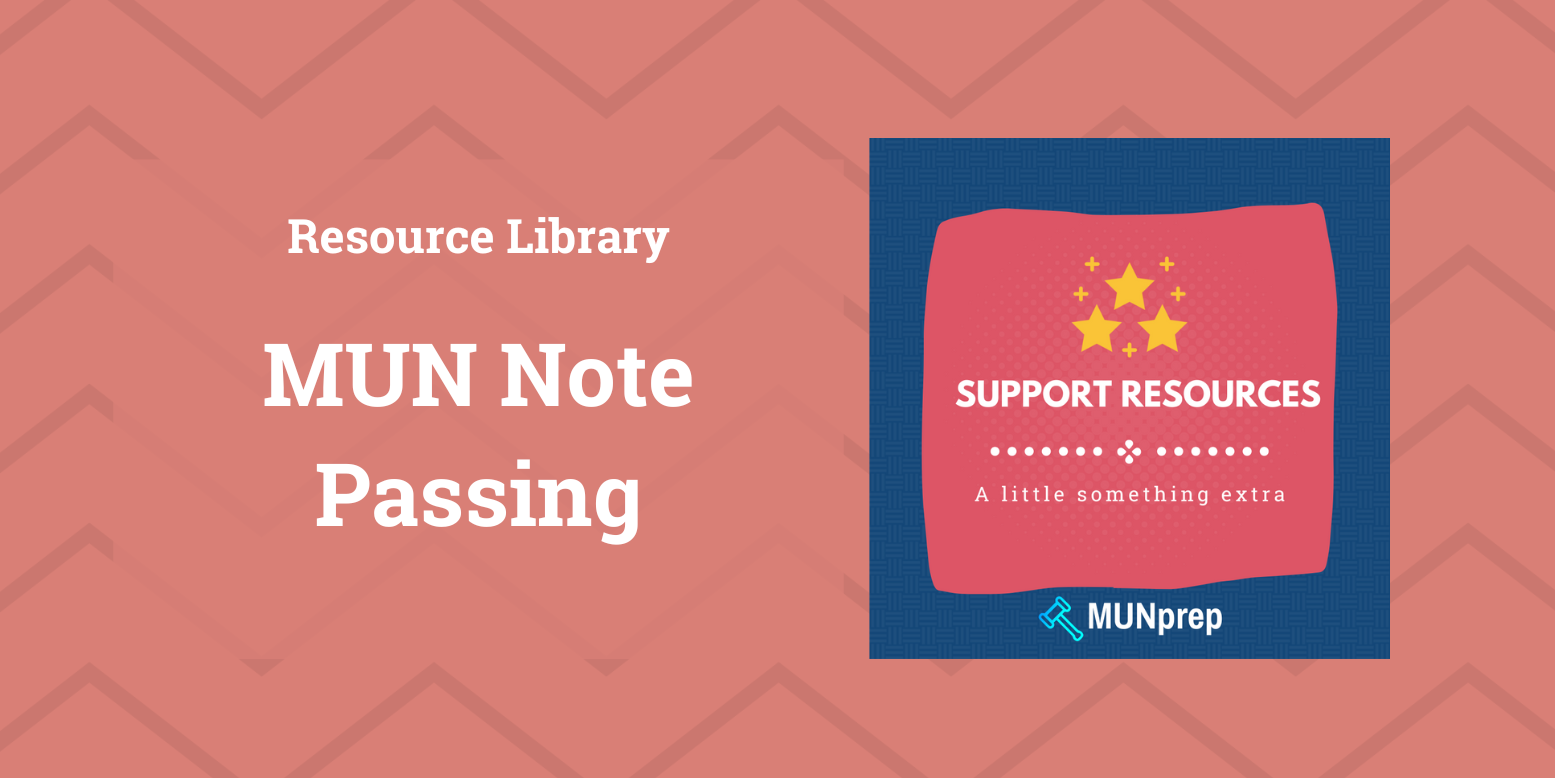
Note passing is often underutilized by delegates in communicating with other delegates during your conference. They're so useful since they allow you to access delegates in your committee room at any time.
It can be a great tool for bloc-building and moving committee forward outside of the traditional channels of Moderated and unmoderated caucusing.
The best delegates in the room will often be those who maintain lines of communication both inside and outside their bloc.
MUN Notes and Bloc Building
Note-passing is a vital communication tool at Model UN conferences, enabling delegates to engage in private discussions and strategize without interrupting the flow of debate.
Building a strong bloc starts with your very first note - where you're listening to delegate's opening speeches and figuring out who to reach out to first.
From the very start, send out as many notes as possible to set up connections with different delegates in your committee. This proactive approach ensures that when the first Unmoderated Caucus begins, you will know exactly who to seek out and have delegates looking for you as well.
The Do's and Don'ts of Note Passing
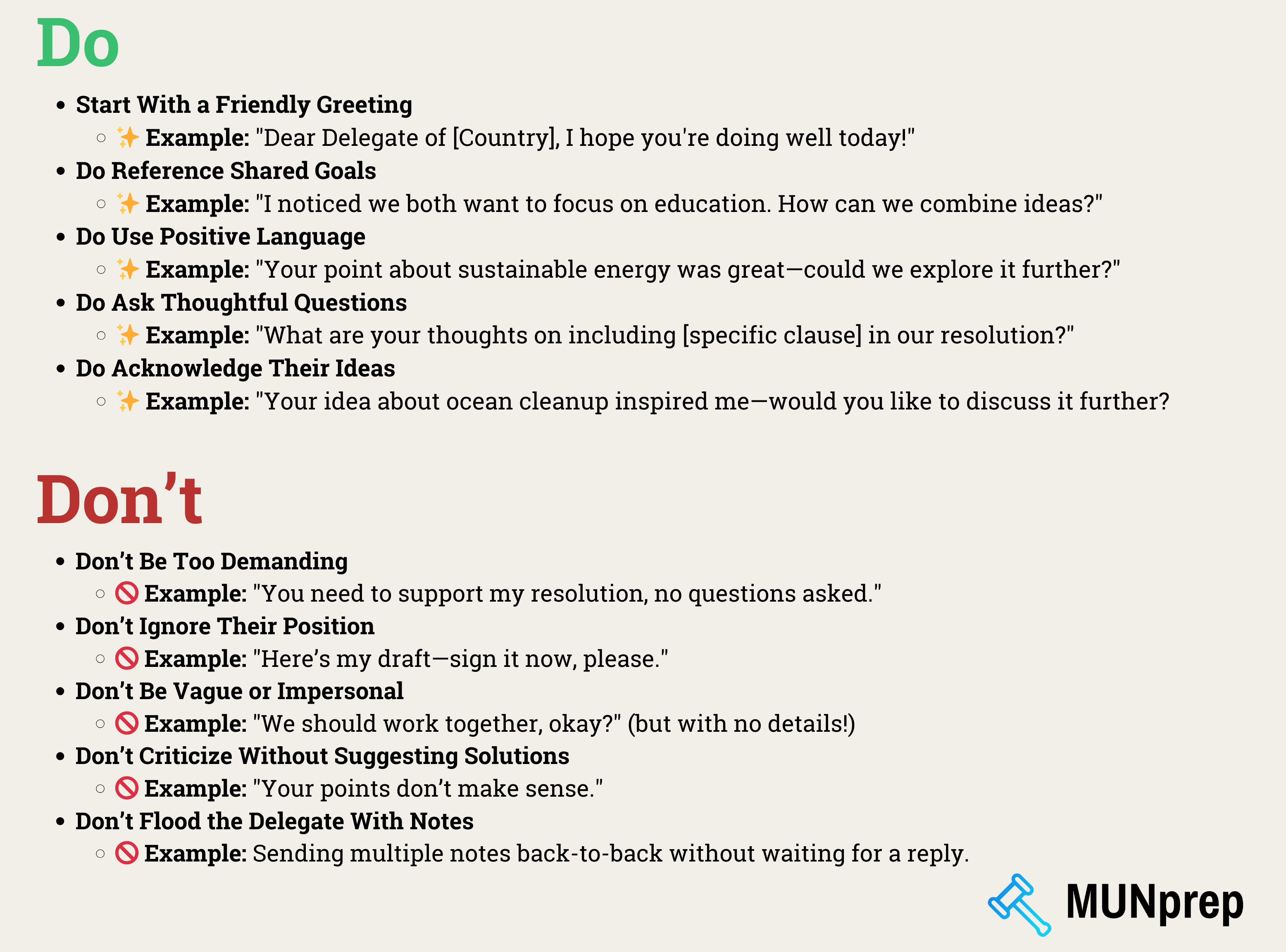
The Different Types of Notes
Passing notes in a Model UN committee is an essential tool for communication, collaboration, and strategy. Unlike public speaking or formal debate, notes allow delegates to engage in private discussions and advance their goals discreetly. Here are the main objectives of passing notes:
- Building Alliances: Notes help delegates identify and connect with allies who share similar positions or goals, enabling the formation of blocs and coordinated strategies.
- Sharing Ideas: Delegates can propose specific clauses, amendments, or solutions to other countries, fostering collaboration without interrupting the flow of debate.
- Gathering Information: Notes can be used to discreetly ask questions about another delegate’s position, their stance on an issue, or their willingness to support a resolution.
- Coordinating Actions: Passing notes allows blocs to plan speeches, strategize voting, and respond to committee dynamics in real time.
- Diplomatic Outreach: Notes provide an opportunity to build rapport, clarify misunderstandings, and negotiate compromises in a professional yet informal manner.
The Most Important Note Type: Bloc Building Notes
For the rest of this guide, we're going to bloc-building notes.
It is a style that can be a bit more difficult to master, but once you get the hang of it every other type of note becomes so much easier! Bloc-building notes are the notes you send at the very start of your conference where you haven't really met anyone and are still trying to get started.
Sometimes, delegates tend to overthink these, so today we'll walk you through our simple and repeatable strategy.
Our Note Writing Strategy
Not sure what to include in your notes? No problem - we've included a few sample notes that you can try out for your next conference.
In these notes we keep things short, positive and open to further communication.
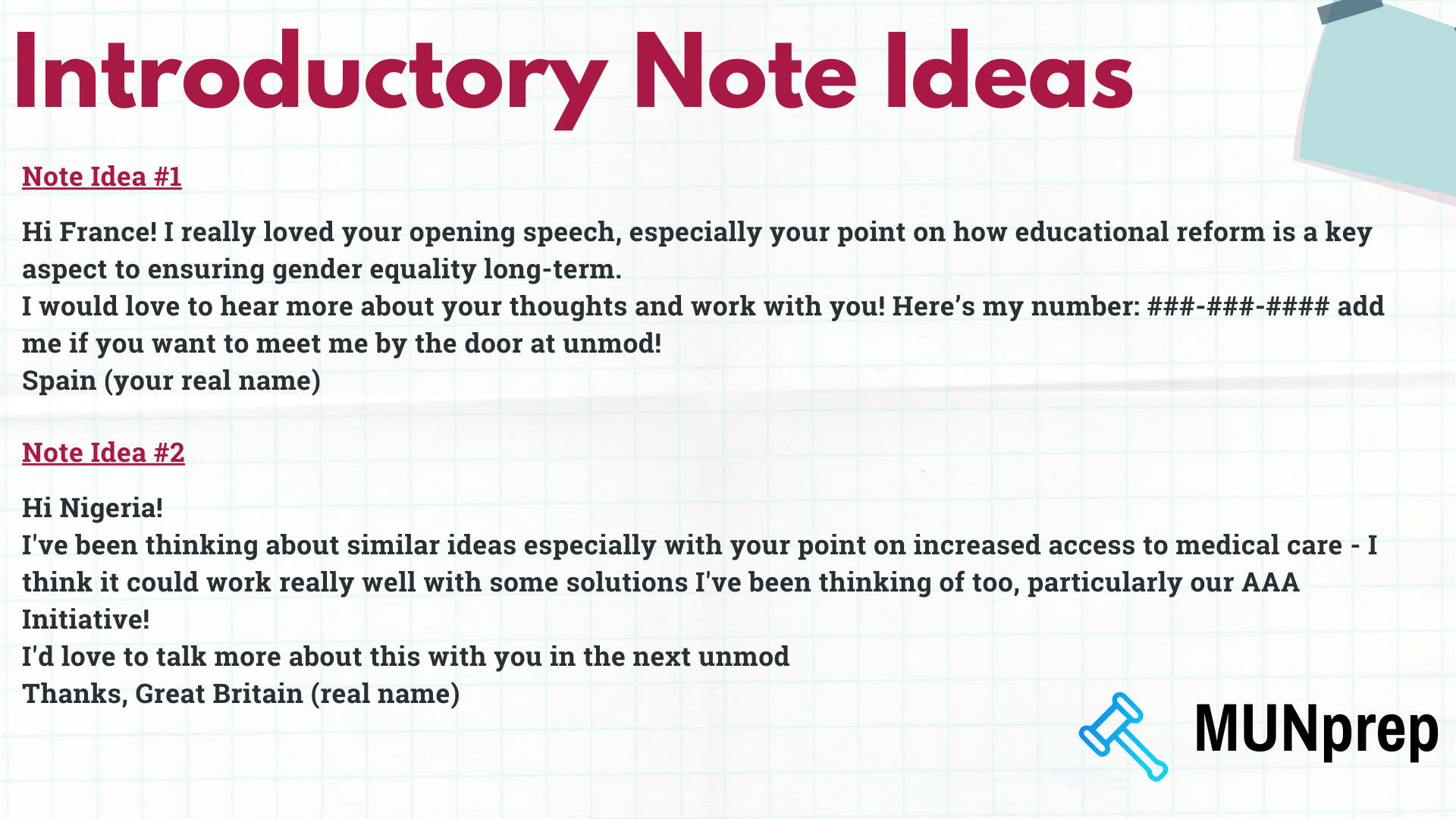
What's great about this note strategy is that its short and to the point, it also gives the delegate an avenue for further communication - you let a delegate know that you’re interested in speaking more more and give a time on when to chat next.
Protocol and Etiquette
- Relevance: Ensure that the content of your notes is relevant to the committee's discussions. Off-topic messages can disrupt the flow of debate and are generally discouraged.
- Confidentiality and Respect: Respect the confidentiality of the communication, but also be mindful that notes may be read by Pages. Avoid sharing sensitive or controversial content that could lead to misunderstandings or conflicts.
- Keep it Neat: Bring some flashcards to the committee beforehand, consider using a different color pen to stand out. The last thing you want to do is to be ripping off corners of paper for every note you write.
Why are Bloc-Building Notes So Important?
In Model UN, building alliances is one of the most critical steps to success, it starts from the very first speech and passing notes is the best way to get ahead of the game.
These early communications are essential for initiating relationships and fostering trust among delegates. Here's why alliance-building notes are so important:
- Breaking the Ice: Formal speeches and moderated caucuses rarely allow for personal, direct interactions. Passing a note is a low-pressure way to start a more informal, low-stress dialogue, especially with delegates you haven’t worked with before. A well-crafted note signals your willingness to collaborate and opens the door for deeper discussions.
- Finding Common Ground: Early alliance-building notes are your opportunity to explore shared interests and goals. By asking questions or suggesting areas of agreement, you can identify potential partners who are aligned with your country's position.
- Establishing Trust: Diplomacy is rooted in relationships, and the tone of your initial notes can set the stage for a strong partnership. Friendly, respectful, and professional communication reassures others that you are a reliable ally.
- Coordinating Blocs: Every successful resolution starts with a group of countries working together. Alliance-building notes help you organize blocs early, giving you a head start in shaping the committee’s direction when that first unmoderated caucus rolls around.

Staying efficient during the Bloc Formation stage
It’s not easy to take notes on everybody’s opening speeches and generally that doesn’t really matter - you’re only looking for delegates who might want to be a part of your Bloc.
What you want to be doing while listening to other delegates opening speeches is taking note of the countries who you could see yourself working with and drafting a quick note.
Quantity is actually more valuable than quality at the start of a MUN conference. When the unmoderated caucus starts, its more important that you have introduced yourself to a number of delegates rather than having sent detailed notes to half as many.
Getting a group established early in your first unmod will also attract other delegates to drift towards your group as it might seem like something important is happening.
What to look for in a Reply
A thoughtful reply to a bloc-building note can signal the start of a strong partnership. When evaluating a response, look for signs that the delegate is open, collaborative, and aligned with your goals. Here are the key things to consider:
Good Signs
- Alignment on Goals: The delegate expresses interest in the issue you raised and suggests shared priorities. For example, “We also see [Issue] as a key concern and would like to discuss solutions.”
- Willingness to Collaborate: They propose working together, mention joining your bloc, or invite further discussion.
- Concrete Ideas: A reply that includes suggestions for clauses or strategies shows they are serious about contributing meaningfully.
Bad Signs
- Vagueness: Replies like “Sounds interesting” or “Let’s see” lack substance and may indicate low commitment.
- Dismissiveness: A response that downplays your ideas or prioritizes their own agenda over collaboration can be a red flag.
- Inflexibility: If they seem unwilling to compromise or insist on dominating the bloc, it could lead to conflicts later.
Starting a Group Chat
After you’ve created your bloc, you’ll want to make a group chat with everyone in the bloc so you can communicate. Keep in mind, that you should always try to avoid switching blocs after Thursday evening because it becomes very challenging to lead a bloc you joined late.
Here are a few pointers on timing:
- If you receive a positive reply to a bloc-building note and feel confident about forming a team, consider suggesting a group chat in a follow-up message.
- However, starting a group chat too early can backfire if the group dynamics shift or if you later decide not to work with certain delegates—it can be uncomfortable to remove people from the chat. Waiting until you’ve established a solid foundation of shared goals helps you make sure the chat stays inclusive and productive.
Also, once you have finished your opening speech you will receive some notes similar to this one, and you can either respond with another note or text them if they have given you their number.
Style Tips for Friendly Yet Professional Notes
In Model UN, striking a balance between a friendly tone and a polished presentation can make your notes stand out while keeping the interaction approachable. Here’s how to achieve this blend:
- Choose Quality Paper: Avoid crumpled or ripped scraps—presentation matters even in informal communications.
- Use a Good Pen: You can use the hotel pens if you need, but a different color pen can help you stand out!
- Keep the Tone Friendly: Make sure to come off as approachable in your notes.
- Start with a friendly introduction like “Hi Delegate of [Country],”
- Use conversational language such as “I loved your speech on [topic]!” or “Would you be open to brainstorming ideas together?”
This balance of formal presentation and casual, friendly content allows you to stand out while maintaining the collaborative and approachable spirit that drives successful diplomacy in committee.
Organizing and Managing Notes
In a busy committee, notes can quickly pile up, so staying organized is key to managing your communications effectively. Here's how to handle both sending and receiving notes:
When Receiving Notes
- Reply to Every Note: Even if you’re unsure about working with someone, sending a polite and thoughtful response helps maintain a welcoming atmosphere.
- This ensures delegates feel comfortable reaching out to you in the future, which can open doors to unexpected opportunities.
- Sort by Priority: Organize notes into two categories: urgent (requiring immediate action or reply - these will be notes from within your bloc or other bloc leaders) and general (informational or non-pressing).
- Keep Track of Key Contacts: Save important notes and keep a list of delegates you’re collaborating or would be interested in collaborating with, especially if they include specific suggestions or agreements.
Sending Notes to the Chair
Writing notes to the Chair is a useful way to communicate during committee sessions, especially when you have a question or need clarification. It’s also useful for raising procedural concerns or bringing up issues discreetly without disrupting the debate. When writing to the Chair, remember to:
- Be Formal and Polite: Address the Chair respectfully, such as "Dear Chair".
- Keep It Brief: Clearly state your question or request in one or two sentences.
- Stay Relevant: Only write notes about matters related to procedure, rules, or debate logistics.
- Sign Your Note: Include your name and country so the Chair knows who is addressing them.
Example: Hello, could you clarify whether amendments will be accepted during the next moderated caucus? Thank you. – [Your Name], Delegate of [Your Country]"
Writing clear, respectful notes ensures effective communication and helps maintain the professionalism of the committee.
Final Thoughts
That's everything we have for note passing! Just like with anything in Model UN the best way to mastering note-passing is with a little practice. As long as you make sure to keep your notes friendly, to the point and send a lot of them - you'll get the hang of it and will be leading a bloc in no time!

